

Knowing by doing: Learning for sustainable muttonbird harvesting. FINALMaoriecosystemsNov2013. Adaptation in Agriculture Lessons for Resilience F. Manaaki Whenua - Landcare Research. Onuku Marae.
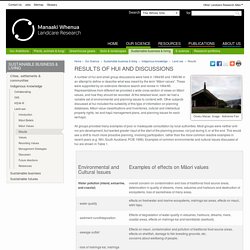
Image - Adrienne Farr A number of hui and small group discussions were held in 1994/95 and 1995/96 in an attempt to define or describe what was meant by the term “Māori values”. These were supported by an extensive literature search and review in 1994/95. Representatives from different iwi provided a wide cross section of views on Māori values, and how they should be recorded.
At the detailed level, each iwi had a variable set of environmental and planning issues to contend with. All groups provided many examples of poor or inadequate consultation by local authorities. The Māori and Pasifika youth leading the way on climate change - TP Plus. Rongoā Māori plants at risk from climate change. Matariki Wehi collecting samples of kuta.
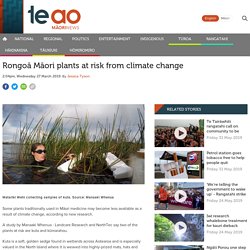
Source: Manaaki Whenua Some plants traditionally used in Māori medicine may become less available as a result of climate change, according to new research. A study by Manaaki Whenua - Landcare Research and NorthTec say two of the plants at risk are kuta and kūmarahou. Kuta is a soft, golden sedge found in wetlands across Aotearoa and is especially valued in the North Island where it is weaved into highly-prized mats, hats and baskets.
Te Tai Tokerau Climate Change Action. Climate and Māori Society. E ngā matāwaka, tēnei te mihi atu a NIWA ki a koutou e noho mai nā i tēnā koko, i tērā koko o te whenua o Aotearoa.
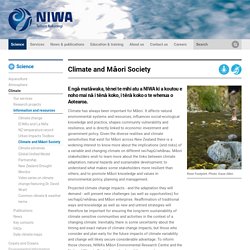
Adapting to climate change stocktake tag report. Welcome to the Office of the Māori Climate Commission. Manaaki Whenua - Landcare Research. Ministry for the Environment. The environment dominates or influences nearly every aspect of New Zealand’s national life.
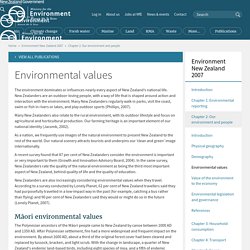
New Zealanders are an outdoor-loving people, with a way of life that is shaped around action and interaction with the environment. Many New Zealanders regularly walk in parks, visit the coast, swim or fish in rivers or lakes, and play outdoor sports (Phillips, 2007). Many New Zealanders also relate to the rural environment, with its outdoor lifestyle and focus on agricultural and horticultural production. Our farming heritage is an important element of our national identity (Jacomb, 2002). As a nation, we frequently use images of the natural environment to present New Zealand to the rest of the world. A recent survey found that 87 per cent of New Zealanders consider the environment is important or very important to them (Growth and Innovation Advisory Board, 2004).
New Zealanders are also increasingly considering environmental values when they travel. A Tangata Whenua Perspective on Sustainability using the Mauri Model. Māori and Biodiversity. The Māori worldview - te ao Māori The Māori worldview considers everything living and non-living to be interconnected.
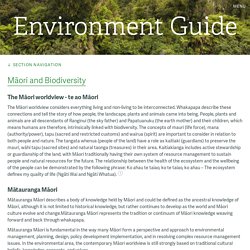
Whakapapa describe these connections and tell the story of how people, the landscape, plants and animals came into being. 13 06 indigenous sustainability indicators for maori farming and fishing enterprises reid. Kaitiakitanga – guardianship and conservation. Understanding kaitiakitanga Kaitiakitanga means guardianship and protection.
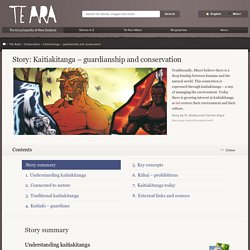
It is a way of managing the environment, based on the Māori world view. A kaitiaki is a guardian. This can be a person or group that cares for an area such as a lake or forest. They are given that role by the local iwi. Western and Mäori Values for Sustainable Development. Western and Mäori Values for Sustainable Development David Rei Miller, Ngäti Tüwharetoa, Ngäti Kahungunu, MWH New Zealand Ltd Forestry, fishery and agriculture account for $1 billion of the $1.9 billion Māori economy annually, but these industries are under threat from environmental destruction and unsustainable resource use.
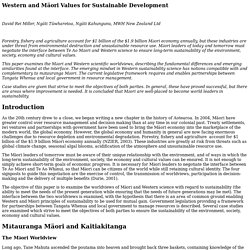
Māori leaders of today and tomorrow must negotiate the interface between Te Ao Māori and Western science to ensure long-term sustainability of the environment, society, economy and cultural values. This paper examines the Māori and Western scientific worldviews, describing the fundamental differences and emerging similarities found at the interface. The emerging mindset in Western sustainability science has notions compatible with and complementary to mātauranga Māori. Case studies are given that strive to meet the objectives of both parties. Introduction As the 20th century drew to a close, we began writing a new chapter in the history of Aotearoa. Māori are among the most vulnerable to climate change. From attacking trees to hugging them, Mike Smith is on a mission to recruit new members to his cause, to save the country from climate change.
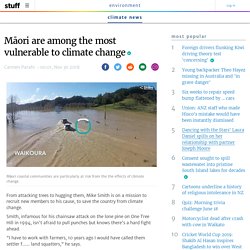
Smith, infamous for his chainsaw attack on the lone pine on One Tree Hill in 1994, isn't afraid to pull punches but knows there's a hard fight ahead. "I have to work with farmers, 10 years ago I would have called them settler f...... land squatters," he says. "Now, I have to try and get these people on board. " READ MORE: * Quick! Freshwater conference embraces Māori values as it looks to the future. Protecting freshwater is not a question of ownership, but guardianship, an iwi representative says.
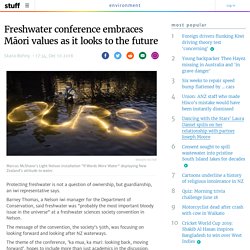
Barney Thomas, a Nelson iwi manager for the Department of Conservation, said freshwater was "probably the most important bloody issue in the universe" at a freshwater sciences society convention in Nelson. The message of the convention, the society's 50th, was focusing on looking forward and looking after NZ waterways.
The theme of the conference, 'ka mua, ka muri: looking back, moving forward', hopes to include more than just academics in the discussion. READ MORE: * Te Waikoropupu Springs' water conservation order hearing wraps up * Ngāti Rārua stand united with other iwi to support Water Conservation Order * Protecting Te Waikoropupū Springs' purity holds deep spiritual significance to iwi Conference convener Cawthron Institute freshwater ecologist Joanne Clapcott, Ngāti Porou, said looking after freshwater was something all New Zealanders had a role in.